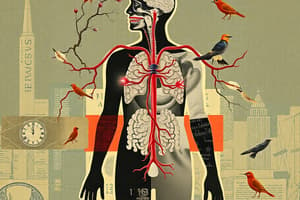Podcast
Questions and Answers
What is a hormone?
What is a hormone?
- A chemical messenger secreted by one endocrine gland or cell into the bloodstream (correct)
- A structural protein
- A type of neural signal
- A digestive enzyme
What is the endocrine system?
What is the endocrine system?
Collective term for all hormone-secreting glands and hormone-secreting cells located elsewhere.
What do the endocrine and nervous systems work together to maintain?
What do the endocrine and nervous systems work together to maintain?
Homeostasis
The components of a hormone pathway include stimulus, sensor, endocrine gland, hormone, target organ, target organ receptor, and ___ .
The components of a hormone pathway include stimulus, sensor, endocrine gland, hormone, target organ, target organ receptor, and ___ .
What triggers an endocrine gland?
What triggers an endocrine gland?
What is the hormone binding site on the target cell?
What is the hormone binding site on the target cell?
What are the types of stimulation for endocrine glands?
What are the types of stimulation for endocrine glands?
What is a humoral stimulus?
What is a humoral stimulus?
What occurs during a neural stimulus?
What occurs during a neural stimulus?
What is a hormonal stimulus?
What is a hormonal stimulus?
Name the major endocrine glands.
Name the major endocrine glands.
What does the hypothalamus regulate?
What does the hypothalamus regulate?
What hormones are secreted by the anterior pituitary?
What hormones are secreted by the anterior pituitary?
What is the function of the thyroid-stimulating hormone?
What is the function of the thyroid-stimulating hormone?
What does adrenocorticotropic hormone stimulate?
What does adrenocorticotropic hormone stimulate?
What are the effects of growth hormone?
What are the effects of growth hormone?
What does follicle-stimulating hormone stimulate?
What does follicle-stimulating hormone stimulate?
What hormone promotes uterine contractions and milk release?
What hormone promotes uterine contractions and milk release?
What does negative feedback do in the endocrine system?
What does negative feedback do in the endocrine system?
What is hyperthyroidism?
What is hyperthyroidism?
What is diabetes insipidus?
What is diabetes insipidus?
What are the two types of Diabetes Mellitus?
What are the two types of Diabetes Mellitus?
What occurs during insulin shock?
What occurs during insulin shock?
Flashcards are hidden until you start studying
Study Notes
Hormones and the Endocrine System
- Hormones are chemical messengers secreted by endocrine glands into the bloodstream, targeting specific organs.
- The endocrine system includes all hormone-secreting glands and cells, coordinating body functions through hormonal signals.
Endocrine and Nervous Systems
- Both systems work synergistically to maintain homeostasis by responding to internal and external stimuli.
Hormone Pathway Components
- A hormonal response pathway includes a stimulus, sensor, endocrine gland, hormone, target organ, and target organ receptor.
Endocrine Glands
- Endocrine glands release hormones when triggered by sensors, influencing various physiological processes.
Stimulation Types for Endocrine Glands
- Humoral stimuli result from changes in blood nutrient or ion levels.
- Neural stimuli involve nerve signals prompting hormone release.
- Hormonal stimuli occur when one hormone triggers the release of another hormone.
Major Endocrine Glands
- Key glands include the pineal gland, hypothalamus, pituitary gland, thyroid gland, parathyroid gland, thymus, adrenal glands, pancreas, and gonads.
Hypothalamus and Pituitary Gland
- The hypothalamus regulates body functions and connects to the pituitary gland, which has anterior and posterior parts, each secreting specific hormones.
Anterior Pituitary Hormones
- Produces six hormones:
- Follicle-stimulating hormone (FSH)
- Luteinizing hormone (LH)
- Thyroid-stimulating hormone (TSH)
- Adrenocorticotropic hormone (ACTH)
- Prolactin (PRL)
- Growth hormone (GH)
Posterior Pituitary Hormones
- Releases antidiuretic hormone (ADH) to conserve water and oxytocin for labor contractions and milk release, both synthesized in the hypothalamus.
Feedback Mechanisms
- Negative feedback regulates hormone release based on target organ influences.
- Positive feedback, exemplified by oxytocin, enhances physiological responses during childbirth.
Growth Hormone Dynamics
- Deficiency leads to short stature or obesity in children and may affect aging in adults.
- Excess produces gigantism in children and acromegaly in adults, treatable with somatostatin analogues.
Diabetes Insipidus
- Results from insufficient ADH, causing significant urine production and concentrated plasma.
Pineal Gland Functions
- Produces serotonin by day and melatonin by night, influencing sleep-wake cycles.
Thymus Gland Role
- Located in the mediastinum, it secretes thymosins, crucial for T-lymphocyte development and immunity.
Thyroid Gland Functions
- Sits below the larynx; produces thyroxine (T4) and triiodothyronine (T3), which regulate metabolism and increase cellular oxygen consumption.
- C cells secrete calcitonin to lower blood calcium levels.
Thyroid Conditions
- Hyperthyroidism, commonly due to Grave's disease, presents with increased T3 and T4, leading to symptoms such as weight loss.
- Hypothyroidism can result from autoimmune damage or iodine deficiency, characterized by low T3 and T4 and symptoms like low BMR and weight gain.
Parathyroids and Calcium Regulation
- Parathyroid glands, usually four, enhance calcium absorption and osteoclast activity, releasing parathyroid hormone in response to low blood calcium.
Adrenal Glands Composition
- Located atop the kidneys, divided into the adrenal medulla (releases catecholamines) and cortex (produces steroid hormones).
Adrenal Hormones
- Catecholamines (epinephrine and norepinephrine) trigger responses akin to the sympathetic nervous system, persisting longer due to bloodstream distribution.
- Corticosteroids include sex steroids, mineralocorticoids (e.g., aldosterone), and glucocorticoids (e.g., cortisol), influencing various bodily functions.
Pancreatic Function
- The pancreas contains islets of Langerhans, secreting insulin (lowers blood glucose) and glucagon (raises blood glucose).
Diabetes Mellitus Types
- Type I is insulin-dependent, resulting from autoimmune destruction of beta cells.
- Type II is non-insulin-dependent, characterized by insulin resistance, influenced by genetics, age, and obesity.
Hyperinsulinism and Insulin Shock
- Overdose of insulin can lead to rapid glucose uptake, causing hypoglycemia and potentially resulting in insulin shock, marked by disorientation and unconsciousness.
Studying That Suits You
Use AI to generate personalized quizzes and flashcards to suit your learning preferences.




